The welcome decision to end male primogeniture for the monarchy has presented historians like myself with an excuse to step outside the realm of history and speculate on what could have been. The current rule on primogeniture saw Prince Albert Edward become Edward VII in 1901 despite having an older sibling - a sister called Princess Victoria. Keeping up with the tradition of the age, Victoria, like her mother and grandfather, had married into German royalty. Germany at the time did not exist as a sovereign political entity though she was moving in that direction. Princess Victoria's husband was Prince Frederick of Prussia, nephew to the childless King Frederick Willian IV of Prussia, the most powerful of the myriad of German royal families.
So what could have happened if Princess Victoria, as the eldest child, inherited the throne on the death of her mother Queen Victoria in 1901 had the new rules on primogeniture been in place then? Firstly, Victoria II would have reigned for only a few months. She died in August 1901. Her son, by then the German Kaiser Wilhelm II, would have inherited the British Crown, and for good measure, would have become Emperor of India as well. Could we have ended up with a common monarchy for the British and German Empires? Could the history of the world have been different because or promogeniture?
Well, there has to be an assumption that the rulers of Britain in 1857, the year Victoria and Frederick were married, would have been prepared to accept the future union of the British and Prussian crowns. This was not without precedent. The Norman kings for example, had ruled England and realms on the Continent. The crown of the UK and Hanover had been united from 1714 until 1837. As Hanover operated Salic Law the crown went to the next male heir. Therefore in 1837 Ernest Augustus, the younger brother of Queen Victoria's father, rather than Victoria herself, inherited the Hanoverian throne. Ironically, the Prussians invaded Hanover in 1866 and annexed the kingdom, ending the separate Hanoverian monarchy.
It is one thing to have a joint crown with a minor state on the Continent. It is quite another for Britain to have the same head of state as a continental great power. Furthermore, the constitutional positions of the monarchy in the UK and Prussia were radically different. Balancing the two would have been at best very difficult. A study of the history of Britain from 1815 to 1914 shows that Britain steered clear of significant continental entanglements. I find it difficult to accept that the rulers of Britain in 1857 would have permitted a dynastic marriage that could have resulted in an entangling commitment.
But let's suppose they were prepared to accept the risk and allowed the marriage of Victoria and Frederick to go ahead. In August 1901, Kaiser Wilhelm would have become William V of Britain. This was a period in which Germany was emerging as the most powerful nation on the Continent yet the development of her navy was too early at this point to push her onto a collision course with Britain. Indeed, some such as Joseph Chamberlain in the 1890s were interested in pursuing friendship, even an alliance, with Germany.
So, could the union of the British and German crowns have led to Britain joining a different continental alliance? It is not too far fetched to believe that. After all, France and Russia were still regarded as traditional foes and France and Britain came close to blows over Fashoda in 1898. Britain and Germany had few colonial differences to cause them trouble. That was not the case with France. And Russia continued to be regarded as a threat to India.
Would this have meant no First World War? Possibly. But there again, imagine the impact of Britain and Germany coming closer together on France and Russia. They could end up feeling more threatened. Far from keeping peace on the Continent, arguably an alliance of Britain and Germany could have brought forward the date of a major war. It could have increased the Russian threat to India and it could have resulted in Britain and France coming to blows over colonial differences. Instead of the First World War starting in the Balkans, it could have started in North Africa.
This is, of course, speculation. It's not history. But it makes for some interesting alternative history theories.
Saturday, October 29, 2011
Thursday, October 27, 2011
Cars and casinos versus cars rather than casinos: the ghost of John Prescott

Secretary of State for Business Vince Cable had a good line in his speech at Liberal Democrat Conference last month: cars, not casinos. The point was that after 13 years of a Labour government sucking up to the financial services sector and letting manufacturing go to the wall, the Coalition has moved us in a new direction in which we support manufacturing. Build cars rather than back the casino activities of the risk-taking bankers (and remember they took risks with other people's money).
Though most Labour members with whom I have conversations seem to believe the 13 years of Labour rule under Blair and Brown never seemed to happen, or have somehow removed those years from their collective memory and conscience, occasional ghosts of their past come back to haunt them and remind them of what they don't want to recall: their 13 years in power. So, a blast from the past today arrived in the form of John Prescott, Labour's very own clowning Cabinet court jester.
British manufacturing may have fared badly under Labour but Prescott did his bit to boost the profile of Jaguar cars. Two Jags Prescott was his nickname. He was also the person responsible for the moves to boost British prosperity by regenerating derelict areas by turning each into a mini-Las Vegas, complete with deregulated casinos. Gambling was the big idea for regenerating Britain under Labour.
Back in 2004, a decision was taken to pack Prescott off to Australia to study how casinos work there. I'm not sure if this was an attempt simply to get rid of him for a while by sending him to the other side of the planet, or was a serious attempt to teach Prescott how to bet, gamble and waste money more effectively. Nevertheless, Junket John arrived Down Under and duely visited restaurants and casinos, complete with taxpayer funder credit card.
His private office managed to spend £456 at the Star City casino in Sydney, £490 at Doyle’s seafood restaurant in Watson’s Bay and £75 at an aquarium. All this has come to light because the Coalition government has decided to publish the details of what's been spent on government financed credit cards.
Labour's plans to turn Britain into Europe's off shore Las Vegas got nowhere, though Labour did a good job at turning us into a banker's casino paradise. Prescott, always something of a hero for many in the Labour party, is something of a Ghost of Labour Past. I wonder what more there is to come out from the publication of Labour's credit card spending.
Tuesday, October 25, 2011
Intent on being part time protesters
It appears that the anti-capitalist protesters see fit to rally to the cause only during daylight hours. A thermal imaging camera panning across the rows of tents in the grounds of St Pauls quickly spotted that during the night, the overwhelming majority of the cathedral's unwelcome guests disappear from the site. Presumably they head back to their comfortable, upper middle class homes where they can snipe at mummy and daddy for being stinking rich before heading off to their comfy feather beds for a good night's kip. Next day they return to their occupation of daytime protesters, calling in at Costa Coffee and other symbols of hated capitalism for breakfast.
I bet the church authorities are regretting their decision to let this mob of middle class muppets camp it up outside St Pauls. Personally, if I had to protest outside St Pauls, it wouldn't be capitalism I would be protesting against. Instead, it would be the appallingly expensive entrance fee that visitors have to pay to set foot in the Cathedral.
I bet the church authorities are regretting their decision to let this mob of middle class muppets camp it up outside St Pauls. Personally, if I had to protest outside St Pauls, it wouldn't be capitalism I would be protesting against. Instead, it would be the appallingly expensive entrance fee that visitors have to pay to set foot in the Cathedral.
Monday, October 24, 2011
Rebellion or whinging?
The obsessive personality disorders of various rightwing Tory MPs are on display today. Europe is back at the heart of Tory troubles. And the right is making as much sound as possible on the vote due shortly in the Commons. Whether or not this will turn into a significant rebellion or a whimpering whine is yet to be seen. My experience of the last government was that there would be a great deal of noise from posturing backbenchers who would sign this or that early day motion opposing their own government. But most were too spineless to carry it through to voting against the government. The media had a field day with headlines about the government about to be defeated, but the story would be quickly forgotten after the vote revealed only a tiny rebellion by Labour MPs with the vast majority of whingers trooping their way through the government lobby.
Today hasn't been much different: backbenchers make a noise about rebelling and the media shouts loudly about a damaged PM. What we don't know at the moment is whether Tory MPs are as spineless as the moaning minnies that populated Labour's backbenchers whilst in government. There are some Tories who are so obsessed with Europe that they are very likely to rebel. After all they have been coralled into a corner by Cameron. They are completely powerless and have no future in government as ministers. Only a goggled-eyed alien from a distant planet would contemplate appointing the likes of John Redwood or Bill Cash to a governmental post. They have nothing to lose by rebelling.
But what about the younger members of the Tory ranks? Will they risk taking a stand on an issue that obsesses them but risk future ministerial careers? That is the unknown at the moment.
There are plenty on the Tory right who want to damage Cameron and make a stand against the Coalition that has locked them out of power but generally tethered them to voting for Coalition policies. The Tory right hates the Lib Dems. They hate the influence we have but they are powerless to do anything about it. A vote on Europe which the government will win comfortably seems an idea opportunity to kick Cameron without bringing down the government. The question is, how many of them are prepared to swing their booted feet in the direction of Cameron's political posterior?
Today hasn't been much different: backbenchers make a noise about rebelling and the media shouts loudly about a damaged PM. What we don't know at the moment is whether Tory MPs are as spineless as the moaning minnies that populated Labour's backbenchers whilst in government. There are some Tories who are so obsessed with Europe that they are very likely to rebel. After all they have been coralled into a corner by Cameron. They are completely powerless and have no future in government as ministers. Only a goggled-eyed alien from a distant planet would contemplate appointing the likes of John Redwood or Bill Cash to a governmental post. They have nothing to lose by rebelling.
But what about the younger members of the Tory ranks? Will they risk taking a stand on an issue that obsesses them but risk future ministerial careers? That is the unknown at the moment.
There are plenty on the Tory right who want to damage Cameron and make a stand against the Coalition that has locked them out of power but generally tethered them to voting for Coalition policies. The Tory right hates the Lib Dems. They hate the influence we have but they are powerless to do anything about it. A vote on Europe which the government will win comfortably seems an idea opportunity to kick Cameron without bringing down the government. The question is, how many of them are prepared to swing their booted feet in the direction of Cameron's political posterior?
Photos from Saturday's regional conference
Saturday saw the North East Lib Dem regional conference held in Gateshead Civic Centre and I was there with my camera to snap a few shots. On arrival I was greeted by Labour Councillor Peter Mole on the stairs leading to the civic suite. I was a bit surprised by his presence, thinking to myself, he couldn't possibly have defected to us as the Lib Dems are far too radical and progressive an organisation for people of the likes of Peter! And then I spotted a Labour gathering in a small room off one of the corridors. What relief we all felt!
Anyway, here are the photos.
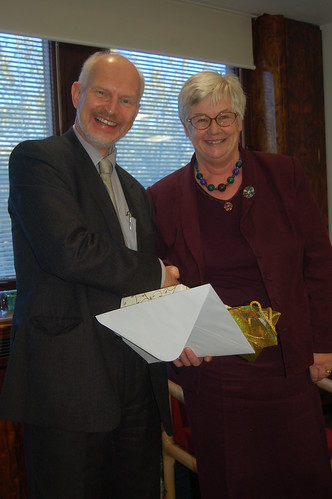
My Gateshead Council colleague Frank Hindle retired as chairman of the region. He was thanked for his work by regional president, Suzanne Fletcher.
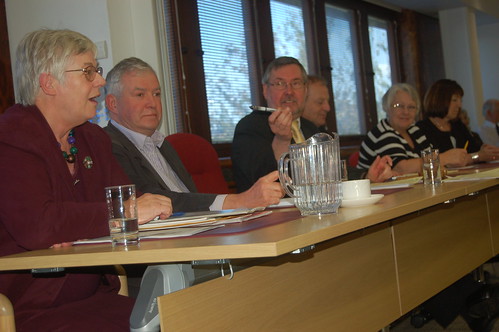
Panel discussion on community politics: Suzanne Fletcher (Stockton), Owen Temple (Durham North), Charles Jevon (Berwick), Ian Swales (Redcar), Penny Reid (Blyth) and Carol Woods (Durham City)
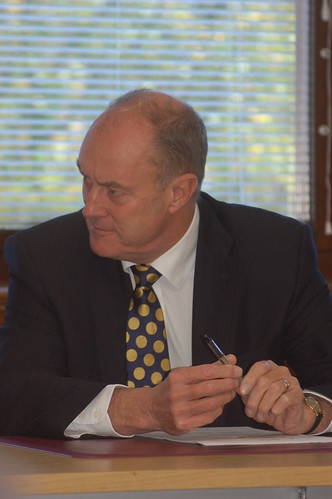
Gordon Birtwhistle MP who gave a good speech on the need to move away from the disaster of Labour's 13 years of sucking up to the financial services sector and get back to supporting manufacturing.
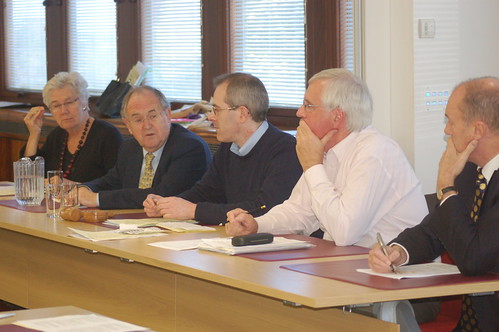
Parliamentary panel: Diana Maddock, Alan Beith, David Freeman (chairing), John Shipley and Gordon Birtwhistle.
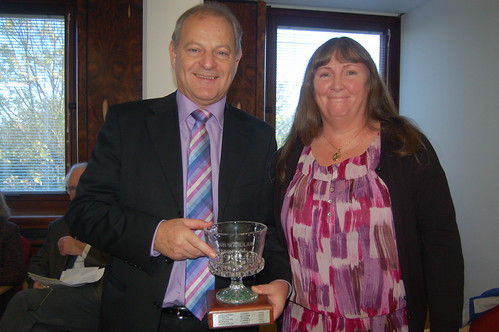
Winner of the Alisdair Wardlaw award for local campaigning was Redcar. Ian Swales and his wife Pat collected the award.
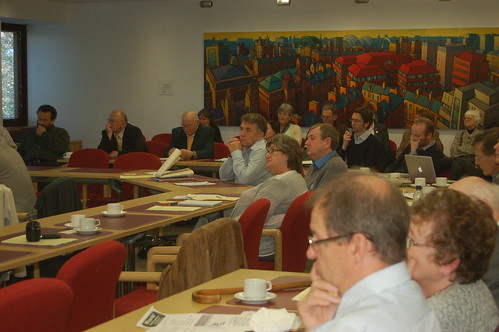
Listening intently.
Anyway, here are the photos.

My Gateshead Council colleague Frank Hindle retired as chairman of the region. He was thanked for his work by regional president, Suzanne Fletcher.

Panel discussion on community politics: Suzanne Fletcher (Stockton), Owen Temple (Durham North), Charles Jevon (Berwick), Ian Swales (Redcar), Penny Reid (Blyth) and Carol Woods (Durham City)

Gordon Birtwhistle MP who gave a good speech on the need to move away from the disaster of Labour's 13 years of sucking up to the financial services sector and get back to supporting manufacturing.

Parliamentary panel: Diana Maddock, Alan Beith, David Freeman (chairing), John Shipley and Gordon Birtwhistle.

Winner of the Alisdair Wardlaw award for local campaigning was Redcar. Ian Swales and his wife Pat collected the award.

Listening intently.
Sunday, October 23, 2011
Whistling a memorable tune at regional conference
It was North East Regional Lib Dem Conference yesterday in Gateshead. The speakers were, as expected, our very own Alan Beith and Ian Swailes along with peers Diana Maddock and John Shipley. The speaker from outside the region was Gordon Birtwhistle, PPS to Danny Alexander. For me, he was an unknown quantity before this conference. I had not met him before and never heard him speak. So I didn't know what to expect.
He turned out to be a very entertaining and informative speaker. He talked about the need for Britain to revive the private sector and especially to build up the manufacturing sector which had fared so badly under Labour. Under the Labour government, the financial services sector was favoured and pampered over and above any other sector of the economy. The calamitous results of that are there for all to see - and suffer.
So, watch out for Gordon Birtwhistle in the future. I suspect he may be going places.
---
Sent via BlackBerry
Friday, October 21, 2011
Local Food Connection

I went to Bill Quay Community Farm in Gateshead this morning for the breakfast launch of Bill Quay Local Food Connection. As a food and social historian and allotment and cookery webcaster, this was clearly going to be of interest to me. The information we were sent explains the project:
Thanks to grant funding from the Big Lottery Local Food Programme, the Farm’s facilities now include a community kitchen, communal eating space and counter for a local food café and farm shop. This distribution and sales hub supports local producers and provides local & regional foods to the community. Along with a programme of inclusive events and activities to engage and educate users the Local Food Connection will offer training experiences and volunteering opportunities for vulnerable adults. Schools and families will be able to use the Connection for educational and recreational purposes.
The Bill Quay Local Food Connection is a new community resource which will make local food accessible, affordable and enjoyable for local people, providing facilities to enable them to taste, buy and cook with local & regional food.
In my opinion, the standardization and mass production of food has led not to a great range of food that a look in a supermarket would suggest is available. Instead, it has led to the loss of local varieties, extra pollution caused by the unnecessary shipping of some foods from thousands of miles away, and an increasing remoteness of food production from the people eating it.
We need to appreciate our food more. That appreciation would increase if we know it is locally produced, rather than churned out of a factory that could be thousands of kilometres away.
So Local Food Connection is getting my full support. I also have a passing interest in Bill Quay Community Farm. I am one of the volunteer beekeepers there. We took some frames of honey off one of the hives a couple of weeks ago. It is now on sale at the farm shop and the proceeds will help support the work of the farm.
Unfortunately we didn't get to try the pig cake, pictured above. I had to head off to theCivic Centre for a two hour meeting on local transport issues.
Wednesday, October 19, 2011
Durham Aged Miners' Homes

A couple of weeks ago we had the official unveiling of the coal tub planters in Marley Hill, a village in my ward in Gateshead. Marley Hill is a former pit village. The pit closed in 1983. It was the last in the North East to use pit ponies. Two coal tubs from the mine were placed outside the village school and used as part of a floral display after the mine closed.
The closure of the school in December meant that the 3 ward councillors - myself, John McClurey and Marilynn Ord - had to think about what to do with the coal tubs. We had funding available for the restoration of the tubs from our community fund. Tanfield Railway carried out the repairs and the Durham Aged Miners Homes Association also made a donation to the project and agreed to site the restored tubs outside the Marley Hill Aged Miners' Homes.
The above photo was taken earlier this month when the Mayor, Joe Mitchinson, came to Marley Hill to unveil the tubs in their new location.
For me, one of the interesting points was the history of the Durham Aged Miners' Homes Association. My great grandfather, Henry Wallace, was first chairman of Whickham Urban District Council and first County Councillor for Whickham, back in the late Victorian period. He was land agent to Lord Ravensworth, one of the great coal owning families of the Victorian North East. I was vaguely aware of his involvement in the creation of the Durham Aged Miners' Homes Association. I chatted about this to some of the officers from the Association who told me they had an official history written by a local historian George Atkinson and they would be happy to send it to me.
I was emailed a copy and had the opportunity to read through parts of it today. I was pleasantly surprised to find out just how closely my ancestor was involved in creating this Association as an organization dedicated to housing retired miners. And whilst Henry wasn't involved with the building of the homes in Marley Hill, (they were built many years after his death), his support for the creation of the Association was recognised when various new streets of homes built by them were named after him, including Wallace Village in Wrekenton in Gateshead.
Family histories can be very interesting!
Tuesday, October 18, 2011
Rumours of a Labour bust up
A special council cabinet meeting had been scheduled for today (Tuesday) with a special council scheduled for Thursday. One item on the agenda of each: Gateshead Council's redundancy policy. Both ourselves and the Labour group had meetings scheduled to take place last night. But around midday yesterday, we were sent a message to tell us that the meetings had been cancelled. Clearly something had cropped up.
The group meetings still went ahead and afterwards I got a more interesting twist on what may have caused the cancellations. I hear on the grapevine of unhappiness in the Labour group. Apparently the comradely brothers and sisters are doing a bit of proverbial knife sharpening. Some may want to place their nicely sharpened implements into the dorsal areas of some of their comrades who don't share their trade union colleagues' direction of travel. I will believe it when it happens. After all, they need: 1)an alternative bunch of leaders; 2)an alternative policy. Neither appears to be available.
The group meetings still went ahead and afterwards I got a more interesting twist on what may have caused the cancellations. I hear on the grapevine of unhappiness in the Labour group. Apparently the comradely brothers and sisters are doing a bit of proverbial knife sharpening. Some may want to place their nicely sharpened implements into the dorsal areas of some of their comrades who don't share their trade union colleagues' direction of travel. I will believe it when it happens. After all, they need: 1)an alternative bunch of leaders; 2)an alternative policy. Neither appears to be available.
Self-Sufficient in Suburbia
This is the latest programme I did for the Horticultural Channel. It is the September edition of Self-Sufficient in Suburbia and follows me in my attempts to grow all my own food. We were on Sky earlier this year but the channel is currently internet based and I'm continuing to make programmes for it.
Since we filmed this we have bought another 3 hens so suggestions for names would be appreciated.
In an army barracks on the day the Defence Secretary resigns
It was my first ever visit to an army barracks last Friday and by a strange coincidence, it was the day Liam Fox resigned as Defence Secretary. Once the stories appeared about him, it was only a matter of time before he went.
The barracks I visited was Catterick in North Yorkshire and the reason for it was to attend the passing out of Gareth Jones, a Welsh Guardsman and son of a friend. Apart from having to get up at 6am to get down there in time, it was a great day. Gareth will be going through some more training over the next few weeks, will do a stint guarding the Queen and is then off to Afghanistan next year.
A few photos and a bit of video of the day now follow:

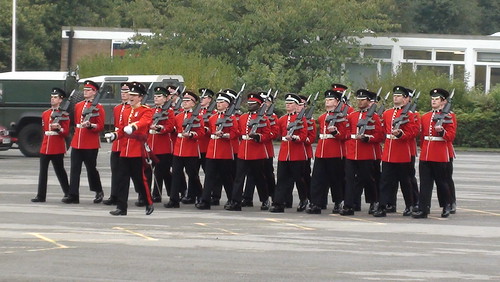
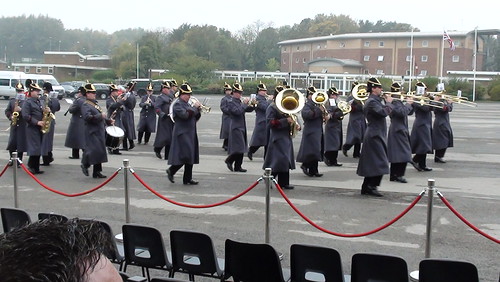
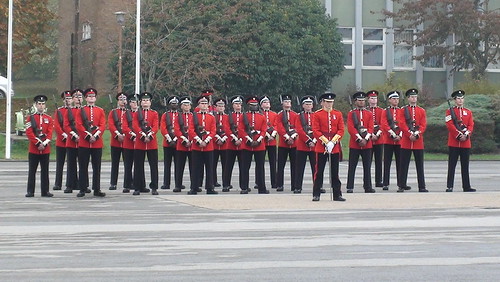
The barracks I visited was Catterick in North Yorkshire and the reason for it was to attend the passing out of Gareth Jones, a Welsh Guardsman and son of a friend. Apart from having to get up at 6am to get down there in time, it was a great day. Gareth will be going through some more training over the next few weeks, will do a stint guarding the Queen and is then off to Afghanistan next year.
A few photos and a bit of video of the day now follow:




I'm back
I had let this blog fall out of use earlier this year. It wasn't a deliberate decision, it was simply squeezed out due to lack of time. I have kept by allotment blog going (www.self-sufficientinsuburbia.blogspot.com) which continues to get thousands of visits each month. I have, however, received a number of comments from people who have expressed some degree of sadness/loss/devastation to their own lives etc caused by my not keeping this blog up to date. One of them was a Labour councillor who had previously told me he never reads my blog. Yesterday he was complaining loudly in front of others that I never write anything on it. Well, I have taken the decision to find the time to write posts for it. So here I am. I'm back!
Subscribe to:
Comments (Atom)